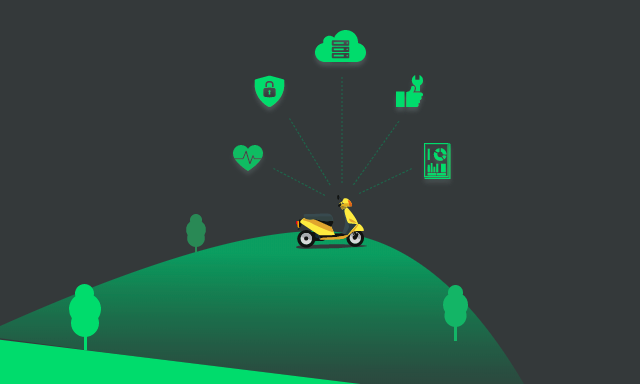Software for electric vehicles: Enabler of smart and connectivity features
The age of electric mobility brings with it new areas of innovation and expertise. In our recent articles, we have talked about associated hardware-related areas of EV ecosystem e.g. charging equipment and facilities, powertrain components, batteries and EV manufacturing as well as e-mobility solutions for passengers and goods, such as fleet operations and logistics.
In this article, we cover SaaS (Software as a service) based Mobility Platforms that provide an operating system for electric vehicles. Such solutions manifest in the form of myriad features that make the EVs safe, secure, smart and connected, help with data analysis, and enhance the overall EV experience through personalisation.
Building Smart features in an EV
The EV OEMs may choose to work on building its smart mobility platform in-house or they may engage the services of a specialist software provider that has expertise in developing smart and connected solutions for electric vehicles. An example of a proprietary platform would be TIROS (Tork Intuitive Response Operating System) developed by Tork Motors, that offers advanced telematics, Artificial intelligence and Machine Learning based features.
OEMs may also choose to integrate with a SaaS-based Smart Mobility Platform to enable smart features, collect and monitor vehicular data, and personalise user experience. These solutions empower personal and shared commute through AI integrated IoT solutions.
Talking to EVreporter, Jyotiranjan – CEO of REVOS (a start-up that offers a SaaS platform for smart mobility), drew a parallel to cell phone industry where different mobile phone manufacturers use Android as a standard Operating System for their products.

Combining Smart Mobility and e-Mobility
Customers expect new mobility solutions to be intelligent and adaptive to their needs. At the same time, electric vehicles wave has broken the huge barriers to entry in the automotive space and many new players are manufacturing EVs in different vehicle segments. This presents a huge opportunity for software companies to build and offer SaaS platforms to these OEMs.
Software plays a vital role in running and subsequent augmentation of an electric vehicle. Power Electronics systems and associated control software are critical constituents of an EV, imperative to its operation. Being software heavy, it is easier to control EV parameters to achieve desired performance and collect data with little technical intervention as compared to conventional vehicles where technically sophisticated EFI (Electronic Fuel Injection system) is required to enable such computer-based controls.
Examples of software-enabled ‘Smart’ features in present-day EVs
Different stakeholders derive value from the integration of the EV with an intelligent software platform. For example, end-user gets access to the following features:
On-board Navigation – Checking your phone for navigation or notification alerts is challenging and unsafe while driving. Turn by turn navigation on the 2W speedometer or car dashboard helps the driver safely reach his destination. The same interface can also show you call alerts.
Range and Charge Prediction – At any point, you can find out the remaining charge in the battery pack and how much distance it will allow you to cover. Before starting for your destination, you can input the destination address and find out if you have enough juice left to make the trip comfortably. You can also see the charging facilities nearby or along the way, and plan your trip accordingly.
Anti-theft Features – Geo-fencing (Create a virtual boundary to allow vehicle movement only within the defined area) | Geo-location (Locate your vehicle and get directions to reach it e.g. when the vehicle is parked in a large and busy parking area) | Lock/unlock the vehicle and handle through the mobile app.
Pre-emptive Remote Diagnostics – Collection of data about vehicle health enables predictive maintenance and troubleshooting. Get to know if any part of the vehicle needs attention.
Apart from offering personalization and convenience to the end-user, connectivity and data analysis are necessary for proper maintenance of an EV. Capturing vehicle data is crucial from a diagnostic point of view in case of EVs where general investigation parameters of heat, vibration and sound are absent.
Over the Air (OTA) Updates – Automatic installation of software and firmware updates through cloud connectivity
Other Features – User profile management, Limit max speed of the vehicle, access ride-history data, call for roadside assistance, automatically alert emergency contacts in case of an unfortunate event
The owner or driver of the EV can access the above features through a connected mobile app or dashboard present on the vehicle.
Other stakeholders such as OEMs and suppliers also benefit from the flow of information from end-user, as they can collect the wealth of data from different parts of all their vehicles on the road. e.g. data about the power consumption of the vehicle or customer usage behaviour. The manufacturers can get specific insights for overall improvement and performance enhancement of the EV using big data analytics and machine learning.
Note – We would like to thank REVOS team for providing inputs for this article. Founded in 2017, Bengaluru based REVOS Autotech Pvt Ltd has over two years of experience in building smart and connected solutions for their partners in India, China and Europe. The company is currently engaged with prominent OEMs (BenlinIndia, Virya Mobility, Euler Motors, SYEV, NDS Motors, OKLA, Batt:RE, Pega), drivetrain and battery manufacturers from China (Xiechang, Coslight, Phylion, Lingbo controllers, Talent FoC & Top power) providing end to end solutions to revolutionise the rider’s experience.
Subscribe today for free and stay on top of latest developments in EV domain.






